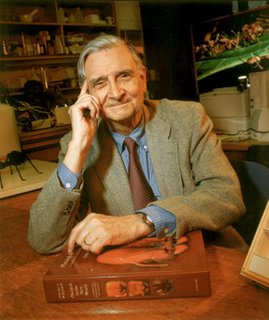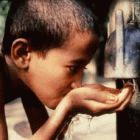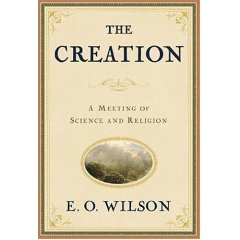
I know it may seem like I am obsessing a bit about E.O. Wilson, but after hearing him talk last week, I thought that other people might like to read about his presentation:
As E.O. Wilson, the Harvard entomologist, put his reading classes on to read from his book at the request of his interviewer, a hush came over the audience. Reading flawlessly, Wilson managed to captivate over 200 people after reading just two pages, enchanting the crowd with his words.
At the beginning of his new book, Creation, Wilson, the Pulitzer Prize winning author, writes to a fictional Baptist minister in Alabama, requesting that the Baptist church and its congregation get involved in protecting the earth. “If a tiny fraction could be recruited, it could tip the balance,” he said to Ira Flatow, his interviewer from National Public Radio’s
Science Friday broadcast.
Wilson’s intention in writing the book was not to give his two cents about the marriage of science and religion, he explained to the crowd at the
New York Public Library last Thursday. “I didn’t want to get into it,” he said. “I have too many relatives in Alabama,” he joked.
The reason that he decided to address the Baptist community, he said, was “pure and simple I wanted to save creation.” There is a natural overlap between the two groups, he explained, even though their ideologies are sometimes at odds.
Wilson doesn’t think that Intelligent Design should be taught in science class or that the scientific and religious communities must reach some sort of compromise. “There is no room for compromise,” he said. “Why would we have to compromise in the metaphysical to take action?”
The two groups come to the discussion from different perspectives, he said, and both can speak of a creation using different words. Baptists have the Bible and scientists have research. Humans see just one tiny section of the spectrum of light and can hear only certain frequencies, Wilson said. Research shows that elephants communicate at lower frequencies than humans can hear, while bats use a higher frequency than humans can hear. We can’t even feel electricity physically like some marine animals unless we stick our fingers in a socket, Wilson said. “Science is the best of what the Old Testament poets could have asked for.”
Wilson is asking the Baptist community to show concern about what is happening to the planet. He illustrated his point by quoting Billy Graham: “Just because humans have dominion over the earth doesn’t mean we have to destroy it.”
Wilson makes his eloquent request because his has seen the damage first hand. “I’m tired of going down to the tropics where I started my research and seeing one more acre of rainforest gone,” he said, leaning back in his chair. The earth’s history shows that one species in a million naturally went extinct every year. Now, because of humans, the extinction rate has gone up an order of magnitude to 1,000 and could reach 10,000 if it’s unabated, Wilson estimated.
“How awkward I feel that I and other scientists should have to plead for life. I feel like a defense attorney,” he told the audience.
Despite the seriousness of the topic, Wilson kept the mood light, telling the audience that he didn’t want to sound like a Pollyanna, but that he did think that we could turn things around. One woman in the audience expressed the effect of Wilson’s message: “Now I feel like I can get up in the morning.”




